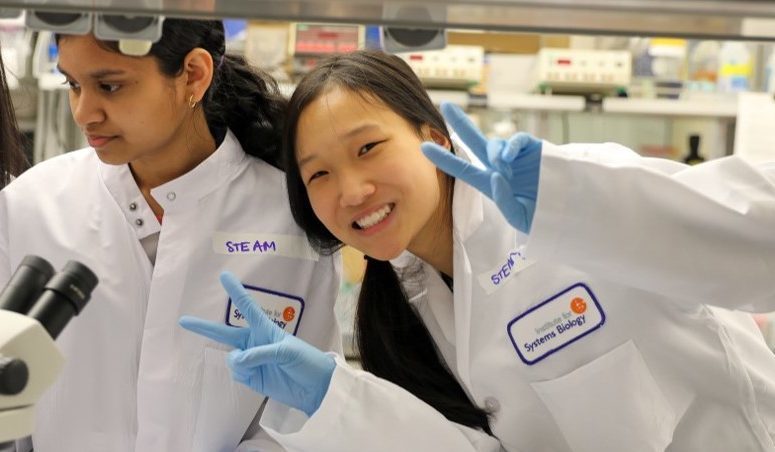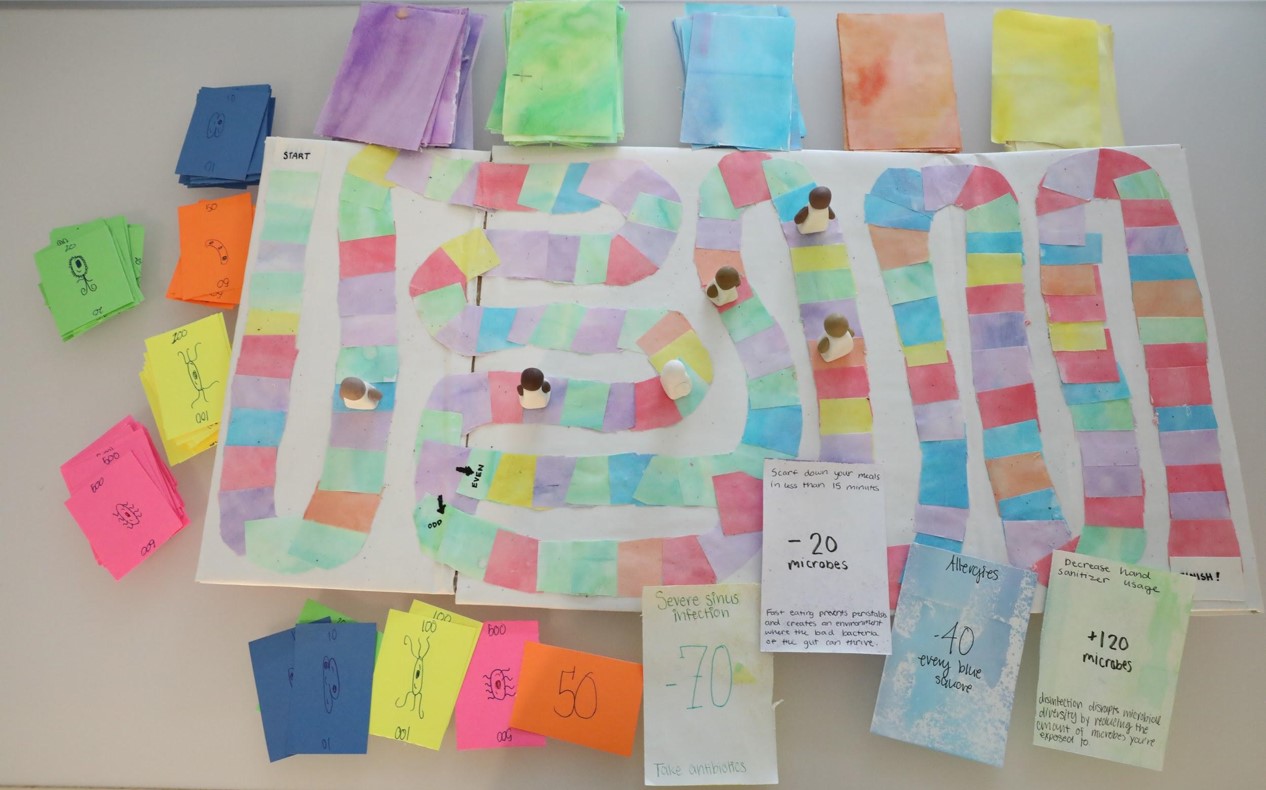STEAM Towards a Healthier World

Kristen Santarin
Edmonds Woodway HS, WA
Senior (2019-2020)
 Career Goals:
Career Goals:
I strive to one day have a career as a doctor because I want to be able to fulfill my passion for biology while also having a direct, positive impact on the wellbeing of other people. Ever since I was a little kid I have always been absolutely fascinated by life sciences and my recent experiences in ISB’s STEAM Towards A Healthier World course has allowed me to further venture into the many facets of biology. The exposure ISB has given me in this three-week course has not only confirmed my desire to pursue a career in the medical field but it has also given me the confidence to know that I have both the motivation and the ability to succeed in the training and eventually the practice of medicine. After learning much about P4 (Predictive, Preventive, Personalized and Participatory) Medicine I am eager to have a holistic approach as a doctor and focus on the personal needs of each and every individual patient. I am currently most interested in the specialties of obstetrics and gynecology as I would love to focus on female reproduction and care for women specifically as my patients. I think it is so important for people to find a career that not only makes them happy and excited to go to work every day but also puts their strengths to use in a way that is helpful to others. As a young woman passionate about biology and interested in making direct and meaningful connections with others, I aspire to become a trustworthy and skillful doctor who patients can turn to to find personal wellness.
What did you learn from this course?
I was very interested in learning about P4 Medicine in this course, which is healthcare that is predictive, preventive, personalized and participatory in comparison to the typical ways of traditional medicine. Its origin is rooted within the works of Dr. Lee Hood of ISB and it has since manifested as an actual practice through the P4 Medicine Institute in Seattle. I think P4 Medicine truly encompasses the recurring theme of systems medicine that I have been taught during my time at ISB. I was fascinated to learn that part of the future of healthcare is extending beyond reactive and pathology focused measures and into a practice that is proactive and particular to the individual wellness, and not just diseases, of people.
What advice do you have for future Ambassadors?
I would tell future ambassadors to take advantage of all the exposure this ISB course gives you to recent scientific advancements and real-life applications of biology. This course is an experience of a lifetime so take notes and never be afraid to speak up and ask questions. Learn as much as you possibly can! You will be introduced to a variety of people who all share a common love for biology so make personal connections with the instructors, guest speakers, and your fellow ambassadors. Everybody has something interesting, insightful, or useful to offer you. Enjoy sharing your excitement for science with these people and be ready to share the information about the environment and health you receive in a less technical way for your community to also understand.
– Showcase Project –
"Microbia! The Microbiome Board Game"
Project Team Member: Dhruvi Joshi
Who/What inspired this project?
We were inspired to focus on the subject of the microbiome after listening to ISB’s own Dr. Sean Gibbons’s lecture about how the microbiome impacts human health. It was really incredible for us to learn how this is still a relatively new field of research in biology. Scientists are just beginning to understand how profound a role the human microbiome has on our health. Because of this, the information of human microbiota was entirely new to both of us as it was never taught in either of our AP or IB Biology classes in high school. It was also mind-blowing that even though it’s such an important part of our health it’s never covered by the school curriculum or our doctors. With our project, we hope to bring the microbiome into the spotlight and educate more of the general public about these amazing little organisms.




How does your project communicate the relationship between the environment and health?
Multiple examples of the relationship between the environment and health are made throughout the entirety of the board game. The vast majority of the squares players can land on are green “Good Choice” squares and purple “Bad Choice” squares. The “Good Choice” and “Bad Choice” squares direct the player to draw a card that will list either a positive or negative choice. Because they impact the microbiome, the choices make players gain or lose microbes, thus changing the diversity of their microbiome. The “choices” listed on cards are very mundane and common, such as what foods we eat and where we go during the day, and though they are seemingly minuscule choices they can accumulate to form major changes on the wellness of our microbiomes and overall health. Each choice and its impacts on our health were weighted so that players can form a clear understanding of how impactful certain daily decisions are on our health. The bottom of each card also explains how each choice directly influences the health of the microbiome. There are also “sick day”, ”wild card”, and “disease day” squares that show that sometimes there are factors out of your control such as getting sick and having to take antibiotics (which hurt your microbiome) but it’s not the end of the world If that’s the case. These squares show that sometimes antibiotics are needed to cure a certain sickness or manage a disease, but you can still have a healthy microbiome and bounce back by making good lifestyle choices.
Who is your target audience?
The target audience of this project is families with members of all ages. We recommend this board game for ages 8 and up so as to ensure that the message can be fully comprehended by players but can still be received at a young and impressionable age. We chose to target this particular audience because we want to improve the general public's knowledge of the human microbiome. By placing the subject in a fun, easily digestible, and accessible family-friendly board game, we are able to raise awareness of the importance of our habits and the impacts of lifestyle and the environment on our health. We believe that people are never too young or too old to gain control over their own wellbeing and this board game serves as a reminder to take care of our microbiota. We also hope that by introducing ideas for small lifestyle changes, such as buying whole-grain bread over white bread, it inspires people to start making small changes in their own lives and instilling these small, healthy habits in their kids.
As an Ambassador, how do you plan to share your message with your target audience?
We plan to share this game with our high school biology classes because that is a relevant and readily available place to share our knowledge and educate our peers about how the choices they make affect these tiny but vital creatures in our gut. The game connects to the class as an extension of base knowledge the class provides, however it is, unfortunately, a topic that isn’t currently covered in the curriculum. We also plan to share the game with middle school science classes and elementary students above the age of 8 to begin educating them about this important ecosystem in their bodies so that they develop healthy habits at an early age and can go home and further educate their family and friends. Another idea is to place this game in the waiting lobby of doctors offices, especially family doctors and pediatricians because that would be a place where our target audience is readily available. The board game is an inspiration to hopefully start a conversation with the doctor about gut health and how to develop and maintain healthy habits and make the right choices. The general public doesn’t know much about the microbiome even though it’s so important to our health. We certainly didn’t know how vital it was until we took the STEAM course so hopefully our project serves to start a conversation and inspire people to make better lifestyle choices for their gut and overall health.

